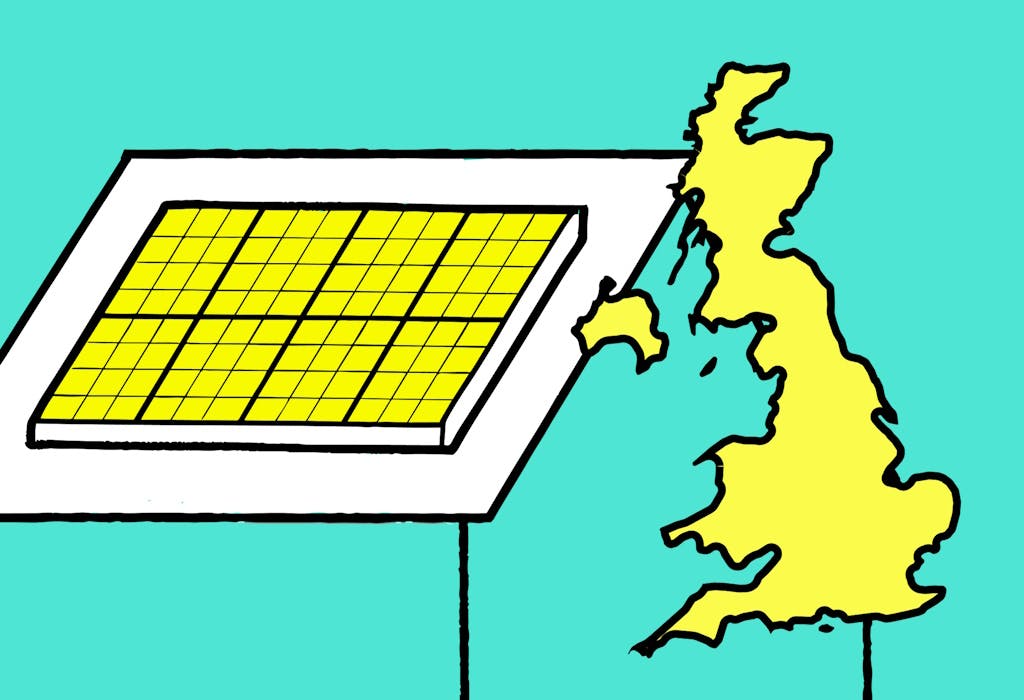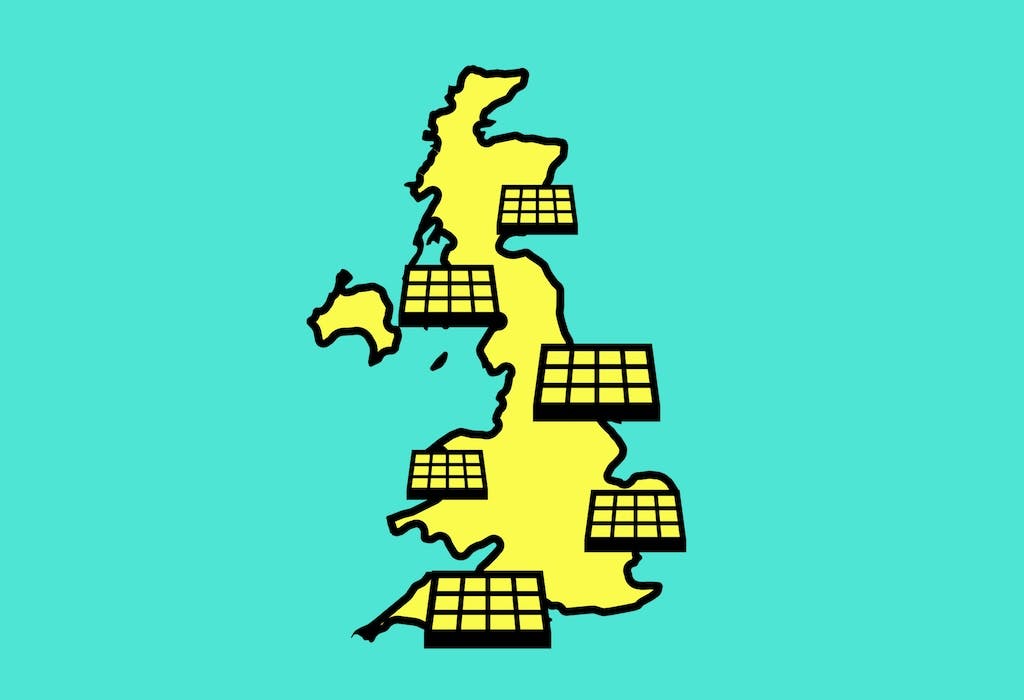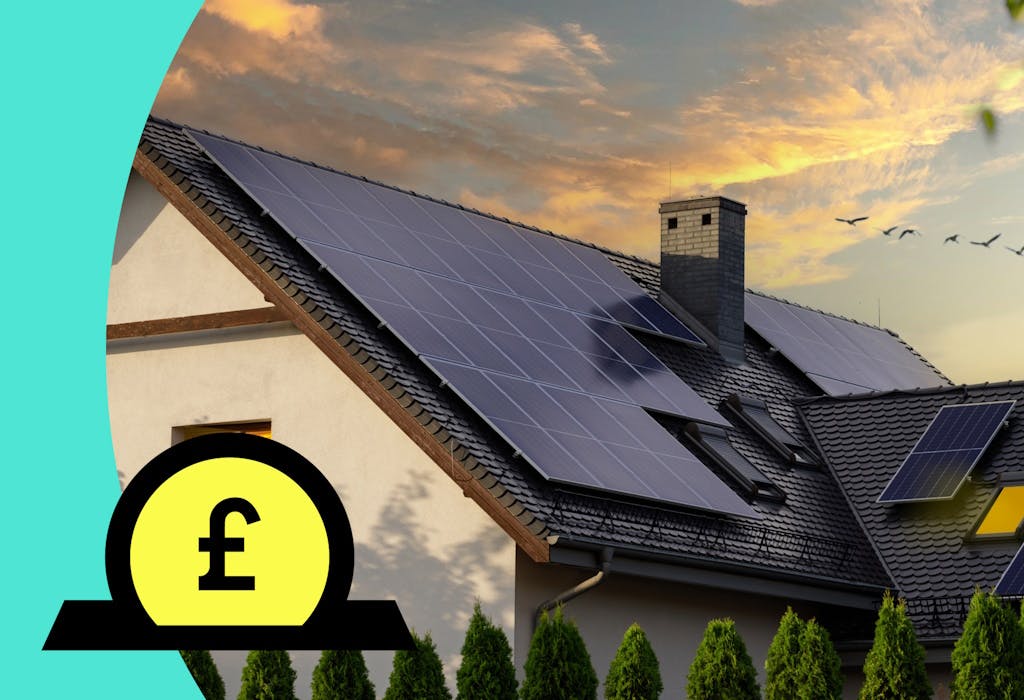- Solar advice hub
- Cities-and-regions
- Solar panels in Sussex: are they worth it?
Solar panels in Sussex: are they worth it?
Here are the best installers in Sussex based on our research, as well as the best available grants and typical costs.


Why you can trust our content
We know that the solar industry is full of misinformation, but we only use reliable sources, including:
- Our experienced solar experts, installers and system designers
- Our own database of solar & battery system designs
- Authoritative bodies like MCS and the UK government




At a glance
If you’re lucky enough to live among the chalk hills and lavender fields of Sussex and you’re looking to cut your electricity bills, solar panels could be the best way forward.
From Stoughton in West Sussex to Jury's Gap beach in East Sussex, this joint area receives more sunlight than almost any other place in the UK, which gives residents with solar panels a massive advantage.
In this guide, we’ll tell you how much solar panels cost in Sussex, how the area’s great weather affects savings, and which grants can help you cut the upfront cost.
At Sunsave we install across the whole of Sussex – so if you’re wondering how much you could save with a solar & battery system, enter a few details below and we’ll generate a quick estimate.
What are the best solar panel installers in Sussex?
| Name | Location | Founded | Customer score | Solar subscription? |
|---|---|---|---|---|
| Sunsave | Greater London | 2021 | 94% | Yes |
| J Kirby Electrical | Eastbourne | 2011 | 99.5% | No |
| Home Smart Energy | Burgess Hill | 2015 | 88% | No |
| Electrotec Power Solutions | Crawley | 2011 | 98% | No |
We’ve used a stringent series of tests to assess more than 2,200 installers across the UK, and these companies above fared the best of any in Sussex.
They’re all certified by the MCS or Flexi-Orb, accredited by the HIES, approved by TrustMark, registered with NAPIT, and have received excellent customer ratings on at least one reputable review site.
The best of the best are also Which? Trusted Traders and offer a solar subscription option, though Sunsave is the only top-rated company that fulfilled the latter requirement.
To see the top companies in the country, check out our national guide to the best solar panel installers.
1. Sunsave
At Sunsave, our mission is to make solar accessible to all UK households, which is why we’re offering the UK’s first solar subscription service to households all over Sussex.
Sunsave Plus allows you to start saving on your energy bills immediately, without having to pay anything upfront.
You’ll get the best-in-class kit installed on your roof, access to the best export tariffs, and the 20-year Sunsave Guarantee, which includes 24/7 monitoring & maintenance, a free replacement battery and inverter, and downtime cover – all for a fixed monthly fee.
You system will also be insured by Aviva against damage, fire, and theft.
2. J Kirby Electrical
Since 2011, this small business run by husband-and-wife team James and Samantha Kirby has served Eastbourne in a professional, dedicated manner.
As a result, it’s earned hundreds of perfect reviews on Checkatrade – and the company cements its customer-friendly status by offering a five-year workmanship guarantee, which is about double the standard warranty.
Talking on the Brilliant Businesses podcast in 2023, Mr Kirby said his company’s motto – ‘we do things differently’ – refers to the way it treats the public.
“It's customer service and how we try to look after people. Around this area, there don't seem to be too many companies that worry about that too much,” he explained.
“20-30% of our diary's filled up with small jobs, because a lot of other electrical companies locally just don't want to know. They just put the phone down.”
However, like every firm on this list apart from Sunsave, it doesn't offer a solar subscription.
3. Home Smart Energy
Home Smart Energy has designed and installed more than 10,000 solar installations – and well over half of these have happened since 2021.
Since 2015, the business – run by Neil and Vivienne Mitchell – has taken on more than 25 employees and can now provide households with solar panels made by Phono Solar, DMEGC Solar, and JA Solar, and batteries made by Pylontech or Fox ESS.
In a January 2024 edition of the Burgess Hill Business Parks Association newsletter, Mr Mitchell wrote: “Home Smart Energy has proved that a personalised solar package can offer outstanding protection against energy inflation, while reducing household bills.”
Though it operates all over the country, Home Smart Energy also has strong roots in its West Sussex community.
Mr Mitchell said his company had a focus on “community engagement and development” in the same newsletter article, and the firm has proven this to be true by partnering with Solar Together, a group-buying scheme that makes it easier for households to go solar.
4. Electrotec Power Solutions
Electrotec Power Solutions has carried out around 2,000 installations since 2011, and its customers have been almost universally happy with the firm's work.
They've written dozens of five-star reviews for the company on Google, leaving Electrotec with a near-perfect rating and countless compliments for the team's reliable, punctual, hard-working approach.
The owner, Luke Hunt, also runs ECO4 South, which turns government grant money into domestic installations that help some of the most underprivileged households in the country.
If you think you might qualify for ECO4 or any of the other solar panel grants currently available, ask him for more information.
How much do solar panels cost in Sussex?
| Property size | System size | Number of panels (430 W) | Estimated cost |
|---|---|---|---|
| 2-3 bedrooms | 3.01 kWp | 7 | £9,000 |
| 4-5 bedrooms | 5.16 kWp | 12 | £10,500 |
| 6+ bedrooms | 8.17 kWp | 19 | £13,500 |
A 3kWp solar panel system typically costs around £9,000 to buy and install in Sussex.
To add a 5kWh battery to your system, you’ll usually pay an additional £2,000, for a total cost of £11,000.
Multiple factors could lead to you paying a different amount for a solar panel system though, like its size, the installation’s complexity, and the installer you choose.
To read about everything else you need to know, check out our guide to solar panel costs.
How many homes in Sussex have solar panels?
37,720 homes in Sussex have had solar panels installed with a Microgeneration Certification Scheme (MCS) certificate, as of May 2024.
Overall, that means 5.2% of all households in East and West Sussex have acquired a solar panel system – or one in every 19.
This is higher than the UK average of 4.6% – as it should be, since Sussex is among the brightest, sunniest areas in the country.
And these Sussex numbers only take into account installations the MCS has certified, so the real number of households with solar panels is likely to be slightly higher.
| Local authority | Homes with solar panels | % of homes with solar panels |
|---|---|---|
| Adur | 1,179 | 4.26% |
| Arun | 3,579 | 4.92% |
| Brighton and Hove | 3,476 | 2.86% |
| Chichester | 3,905 | 7.22% |
| Crawley | 1,675 | 3.68% |
| Eastbourne | 1,722 | 3.78% |
| Hastings | 1,272 | 3.14% |
| Horsham | 3,937 | 6.31% |
| Lewes | 3,210 | 7.35% |
| Mid Sussex | 4,212 | 6.65% |
| Rother | 2,619 | 6.22% |
| Wealden | 5,281 | 7.73% |
| Worthing | 1,653 | 3.34% |
| Total: 37,720 | Average: 5.2% |
Are there any grants for solar panels in Sussex?
There are grants for solar panels available in Sussex, thanks to local initiatives and national government schemes.
If you’re not eligible for any of these programmes, but still can’t afford the price of solar panels, have a look at Sunsave Plus, which is available at no upfront cost.
For fixed monthly payments over 20 years, you’ll receive the best-in-class kit, full monitoring and maintenance support, and a system that can save you money from day one.
Solar Together Sussex
Solar Together is an initiative that helps residents in a specific area secure a sizable discount on their solar installations through collective buying.
In Sussex, more than 10,000 local homes signed up during the 2023 edition of the scheme, which has operated in the region since 2019 and is supported by councils including West Sussex, East Sussex, and Brighton and Hove.
You can take part in Solar Together if you’re a homeowner, small or medium-sized business owner, or tenant – as long as you have your landlord's permission.
It only runs for a limited amount of time in each area, so watch out for when it comes back to Sussex.
To learn more, check out our guide to Solar Together.

Social Housing Decarbonisation Fund
This government programme gives funding to local councils that they can use to improve the energy efficiency of social homes in their area, including measures like solar panels and insulation.
In 2024, the government awarded £2.3 million of funding to Lewes District Council, and £1.47 million to Wealden District Council.
This was a first for both these councils, but Sussex residents have benefited from Social Housing Decarbonisation Fund grants before.
Crawley Borough Council has received £7.5 million from this initiative, which it has so far used to carry out 122 measures across 57 households, according to the government.
It’s not clear how many of these measures in Crawley were solar panel installations, but they make up about 10% of all installations across the country.
You can’t apply to the scheme, but if you live in Lewes or Wealden, you can contact your local council to advocate for your social housing to be included in any measures.
National grants
Two national grants are available to Sussex households – and if you’re eligible for either, you should absolutely consider applying.
Solar panels can cut your electricity bills by hundreds of pounds per year, shrink your carbon footprint, and increase your property’s value, but the upfront cost is often high. If you don’t have to pay it, you shouldn’t.
Home Upgrade Grant
The Home Upgrade Grant gives funding to local authorities so they can pay for energy-efficient improvements in low-income households that aren’t connected to the gas grid.
This government-backed scheme is only available to properties that hold a valid Energy Performance Certificate (EPC) with D, E, F, or G rating.
If your home is eligible, you could get a largely discounted or free solar panel system, wherever you live in Sussex.
In the most recent wave of funding, the government gave £41.4 million to a consortium that included – as well as councils in different areas – Arun, Adur, Brighton and Hove, Chichester, Crawley, Horsham, Mid Sussex, and Worthing.
Another consortium made up of councils from Lewes, Eastbourne, Hastings, and Rother won £6.23 million in funding.
And Wealden District Council, operating on its own, was handed £1.87 million.
To see if you could qualify, apply through the government’s site or call your local council.
Energy Company Obligation (ECO4)
This government scheme compels large energy suppliers to install energy-saving improvements in low-income and vulnerable households that heat their homes with electricity.
If you think you might be eligible and you receive at least one qualifying means-tested benefit – such as Income-based Jobseekers Allowance or Child Tax Credits – you could potentially get an energy supplier to install a free solar panel system at your property.
More than 21,700 solar panel systems have been installed in the UK through ECO4 since it started in July 2022, which is just over 5% of all measures taken through the programme.
Is Sussex sunny enough for solar panels?
Sussex receives significantly more sunlight than the great majority of areas in the UK, with Lewes getting 1,357 kilowatt-hours per square metre (kWh/m²) on average per year – 24% higher than the national average.
This number will differ depending on where you are in Sussex, but it’s still a fantastic indication.
Lewes’ figure is based on the European Commission's Photovoltaic Geographical Information System, which provides regularly updated solar irradiance statistics.
The solar panel industry measures sunlight by tracking the sun’s average intensity in a specific area, which it calls ‘solar irradiance.’
It’s assessed in kilowatt-hours per square metre – that is, how much energy makes it from the sun, through 93 million miles of space, to a specific square metre on Earth.
There are many factors that affect solar panel output, but solar irradiance is one of the most crucial.
As you may expect, the more intense the sunlight that hits your panels, the higher the kWh/m², and the more solar electricity your installation generates – which means higher savings for you.
How much power can a solar panel system generate in Sussex?
A solar panel system in Sussex can generate enough electricity to power the majority of your home’s electrical needs, allowing you to reduce your electricity bills.
We designed the system below for a household in St Leonards-on-Sea that uses around 4,140kWh of electricity per year.
| Location | System size (kWp) | Battery size (kWh) | Average output per year (kWh) | Consumption (kWh) |
|---|---|---|---|---|
| St Leonards-on-Sea | 4.3 | 5.8 | 3,669 | 4,140 |
This design includes 10 solar panels, each with a power rating of 430 watts (W). All together, they form a 4.3 kilowatt-peak (kWp) system – that is, a system that generates 4,300kWh per year in ‘standard test conditions’ (which use a solar irradiance of 1,000W per m²).
Since Sussex is one of the sunniest places in the country, this installation would produce 3,669kWh per year – an impressive 85.3% of the quantity it’d generate in standard test conditions.
Our design also includes a 5.8kWh battery, which allows the household to use 1,981kWh of the electricity their solar panels produce in a year, which makes up 48% of their total consumption.
The other 1,688kWh generated by the solar panels would be sent to the grid, using an export tariff called Octopus Flux – one of the best export tariffs on the market.
We’ve worked out these savings by using the NREL System Advisor Model (SAM), which incorporates solar irradiance data based on the latest weather patterns, statistics about the system’s inverter, and smart battery controls that maximise export savings.
Please note: you won’t necessarily generate as much solar electricity with your system, since this design is for a specific property that may be different to yours – but it should give you a rough indication of what’s possible in Sussex.
Is it worth getting solar panels in Sussex?
It’s absolutely worth getting solar panels in Sussex, more so than most places in the country.
Sussex benefits from high levels of solar irradiance – particularly when compared to the UK average – which enables residents to save hundreds of pounds per year.
There’s a reason why 5.2% of households in East and West Sussex have decided to get solar panels – and that percentage will likely rise over the coming years, as energy bills stay high and heat pumps and electric vehicles continue to become increasingly popular.
If you’d like to buy solar panels but the upfront cost puts you off, you could see if you’re eligible for assistance from initiatives like the Home Upgrade Grant or ECO4 scheme.
And if you don’t qualify for a government grant, you should consider Sunsave Plus, our all-in-one residential solar and battery solution that’s tailored to your home, and delivered as a monthly subscription at no upfront cost.
It also comes with 24/7 monitoring and maintenance, free replacement parts (including a battery and inverter), and downtime cover. Your system will also be insured by Aviva against damage, fire and theft.
At Sunsave we install across the whole of Sussex – so if you’re wondering how much you could save with a solar & battery system, enter a few details below and we’ll generate a quick estimate.
Solar panels in Sussex: FAQs
Related articles

How many homes have solar panels in the UK?
Read full story
The 11 sunniest places in the UK
Read full story
How many solar panels do I need?
Read full story
Are solar panels worth it in the UK?
Read full story
Written byJosh Jackman
Josh has written about the rapid rise of home solar for the past six years. His data-driven work has been featured in United Nations and World Health Organisation documents, as well as publications including The Eco Experts, Financial Times, The Independent, The Telegraph, The Times, and The Sun. Josh has also been interviewed as a renewables expert on BBC One’s Rip-Off Britain, ITV1’s Tonight show, and BBC Radio 4 and 5.